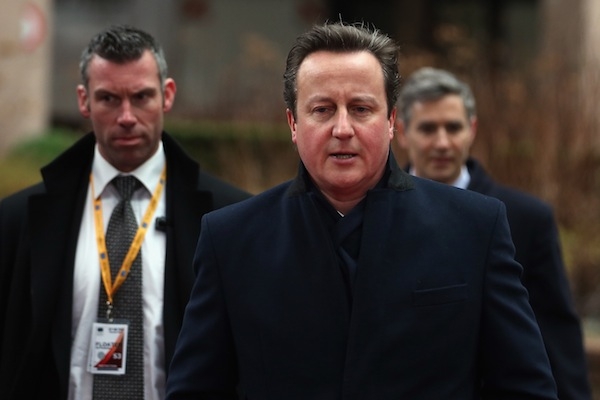The Haribo they were eating all night clearly worked: European leaders have just agreed on the first budget cut since the EU’s formation. All credit to David Cameron for getting more than even he’d imagined was possible. But what does the Prime Minister do next?
Well, he could do what he did after his historic EU speech, which is to make a rather paltry attempt at capitalising on the excellent mood in the Conservative party by organising an afternoon Commons debate with William Hague congratulating his leader on being so eurosceptic and poking fun at Labour. Apart from that debate, which barely made an impression within the parliamentary estate, let alone with voters, the Downing Street machine retreated again, job done, leaving Tory MPs to start fighting over gay marriage and which unlikely backbencher they could line up to replace Cameron or how they could eject George Osborne. A month or so ago, it was difficult to get through even the briefest of conversations with a Tory MP without the words ‘Europe’ or ‘referendum’ cropping up. Now they’re happy to talk about anything else.
Or he could do what he did with gay marriage, which was to make a personal, principled push for legislation he believed in over a number of months and then, as the second reading approached, go to ground. As James noted, this backing away from confrontation is pretty typical Cameroon behaviour. It wasn’t entirely unwise: the Prime Minister would have received just as much flak had he gone too far the other way, giving a series of speeches and interviews in the days running up to the vote which appeared to put pressure on his backbenchers when some were already questioning whether the free vote they had been promised was quite as it seemed. But it also meant that he wasn’t there to put his own stamp on the legislation, to claim Conservative credit for what he sees not only as right but a key part of the party’s ongoing modernisation project rather than allowing the bill’s opponents to steal the limelight. The Bill still has committee stage, report stage and third reading in the Commons before it even goes up to the Lords, so the Prime Minister still has an opportunity to make a big song and dance about what his party is doing and make it clear that this isn’t a Labour victory, it’s a Conservative victory.
The Prime Minister needs to become more obsessive about his messaging. Those backbenchers who are loyal to him find it frustrating that he never seems to quite capitalise on his good moments. He sometimes picks up nice ideas and then seems to forget about them: in his party conference speech, he talked about ‘spreading privilege’, but hasn’t mentioned the phrase since. Which is odd when you consider that a number of the announcements from the government since have very neatly fitted this description: Nick Boles on planning, Liz Truss on childcare, Michael Gove on education reforms. All of these policies will help spread privilege, by giving children an equal start in life, by giving families the opportunity to afford their own home, or at least afford to rent a property near jobs, and by helping mothers get back into work. Yet there doesn’t seem to be enough central message discipline for the phrase to have made it into the launches of any of these policies. If he realised that ‘spreading privilege’ was an oxymoron, why not start talking about the ‘great ignored’ again: a phrase he seems to have, er, ignored since using the phrase to launch the 2010 general election.
At least Ed Miliband, to give him credit, hammered his message (what there was of it) home using a series of speeches and interviews over several months. That message wasn’t about a policy, it was about who Miliband was, and he had the space to do it because he didn’t have much else to really talk about at the time. But the point is that by the time we reached last autumn’s conference speech, it wasn’t just Westminster village inhabitants who were aware of Miliband’s parents’ story and his own identity. Then he moved on and branded everything with ‘One Nation’.
Obviously this is easier when you are the Opposition leader whose policy review hasn’t reported back yet, but Cameron needs to have that same obsessive focus on themes, wrapping big ideas up in regular policy announcements. And he needs to keep talking about victories and big policy pushes, not assuming that just because he’s mentioned them once, voters will have noticed at all. The old mantra about the rest of the country only noticing when your own team is bored to death of an idea is something Cameron needs to remember.
All of which means that Cameron needs to start banging on about Europe, not just at Prime Minister’s questions, and not just using dull backbench debates or the statement he’ll give to MPs on his return, but in television interviews, speeches, newspaper articles. And he needs to keep banging on about his other victories until he’s sick to the teeth of talking about them. The opposition won’t do it for him, and neither, at the moment, will his backbenchers.







Comments